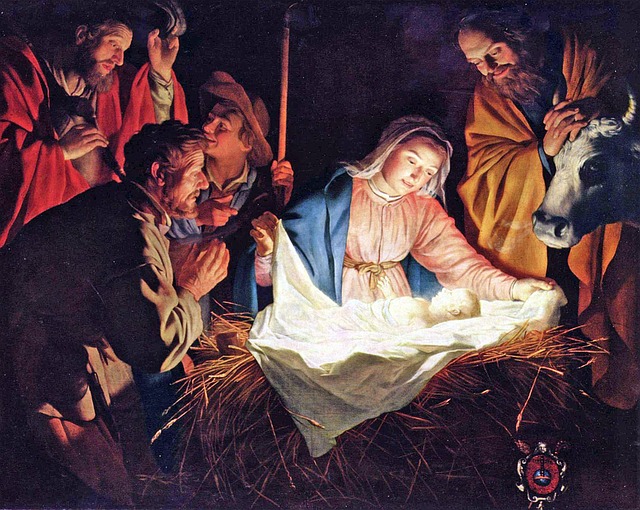 "In the tender compassion of our God the dawn from on high shall break upon us, to shine on those who dwell in darkness and the shadow of death and to guide our feet into the way of peace." (Excerpt from the Canticle of Zechariah, Lk 1:78-79)
"In the tender compassion of our God the dawn from on high shall break upon us, to shine on those who dwell in darkness and the shadow of death and to guide our feet into the way of peace." (Excerpt from the Canticle of Zechariah, Lk 1:78-79)Just about everyone has a favorite part of the Christmas story. For some, it’s the journey of Mary and Joseph to Bethlehem. Others like to meditate on Joseph’s attempt to find suitable accommodations for his wife, soon to bear a child. And many people enjoy contemplating the scene inside the stable, shining gently with the light of that night when heaven met earth.
While the emphasis on the Holy Family is certainly appropriate, for many people, the best-loved part of the Christmas story is the scene involving the shepherds, as recounted in the Gospel of Saint Luke (2:8-20).
When the fullness of time had been accomplished, God sent His heavenly messengers not to the palace of King Herod but to a Palestinian hillside remarkable to none except perhaps those inhabiting it.
The recipients of the message were not garbed in silk and dripping with precious jewels; rather, they were barely clothed well enough to brave the elements in which they lived.
Well-educated, worldly, sophisticated? Hardly. A better description would be unlettered, crude, considered by most to be dishonest to the point of thievery. Yet these were the men through whom the Creator chose to spread to the world the glorious message of His only Son’s arrival on earth.
Certain stereotypes surrounded the class of people who made their living tending sheep in Jesus’ time. Considered unclean by reason of all their work entailed, shepherds occupied an extremely low rung on the social ladder. The general opinion was that they were men of questionable character who supplemented their meager living by stealing.
I once heard shepherds described in a homily as simple men doing simple work, and while this true, there was the added element of class status holding them well below the typical farmer or householder of the Times.
What was it that the Lord was trying to tell His people, then and now, by commissioning such lowly folk to bear the glad tidings to the world beyond their hillside?
As we know, this theme of lowliness was carried through in the setting of Jesus’ birth as well.
Once their initial apprehension at the angels’ appearance had calmed, the shepherds must have felt a sense of comfort and reassurance, although perhaps tinged with uncertainty, when the “Messiah and Lord” was described as “wrapped in swaddling clothes and lying in a manger.”
And when they reached their destination, as directed by the angel, they would have felt right at home in the familiar atmosphere of the humble stable that housed the Son of God.
It is difficult for us to imagine the quiet stillness of the setting before the angels’ arrival. Even if we’re alone at home, we still are surrounded by sound. Appliances hum, cell phones ding, traffic passes by outdoors.
The shepherds knew nothing of appliances, cell phones, automobiles. We can imagine that theirs was essentially a quiet occupation, broken only by their calls to the sheep and the animals’ occasional bleating.
Perhaps more to the point, a certain stillness of spirit was possible for them, next to impossible for most of us to achieve with today’s complicated lifestyles and ever-present technology. As quiet men living quiet lives, they would have been open to the angelic message they were privileged to hear.
If they were devout Jews, they would have had some knowledge of the prophecies promising the arrival of a Messiah. The fact that they obeyed the angel’s directions “in haste” lends itself to an assumption that their response was indeed based on faith.
The Canticle of Zechariah, an element of the official daily Morning Prayer of the Church, foretells the angelic visit to that darkened hillside, where humble men kept the night watch over the flocks entrusted to their care.
The manifestation of God’s “tender compassion” was made known to them at their journey’s end, as the “dawn from on high” broke over Bethlehem. The heavenly light that shone upon them at the angels’ song surely paled in comparison with the divine glow emanating from the crude cradle embracing the Light of the World.
The message of the multitude of angels had been one of peace: “Glory to God in the highest and on earth peace to those on whom his favor rests.” These words lead us back to the closing of the Canticle of Zechariah.
The shepherds were the very first human beings chosen by God to have their feet guided “into the way of peace” at the angels’ bidding. And isn’t peace what men of good will continue to long for today? The peace of that darkened hill in Palestine. The peace in the hearts of simple shepherds. The peace of the stable. The peace on the faces of Mary and Joseph. The peace emanating from the hands of the Baby in the manger, reaching out to bestow it upon His creatures.
The “tender compassion of our God” was poured out upon an undeserving world and manifested itself as Love Incarnate.
The shepherds — names unknown, spoken words unrecorded, lives unheralded — became key players in the greatest story of all time.
As we journey through these last busy days of Advent, we can keep our sights focused on the shepherds and make it our goal to imitate their simplicity of heart, openness to God’s voice, great humility, and perhaps most important of all, their inner peace.
© All Rights Reserved, Living His Life Abundantly®/Women of Grace® http://www.womenofgrace.com
